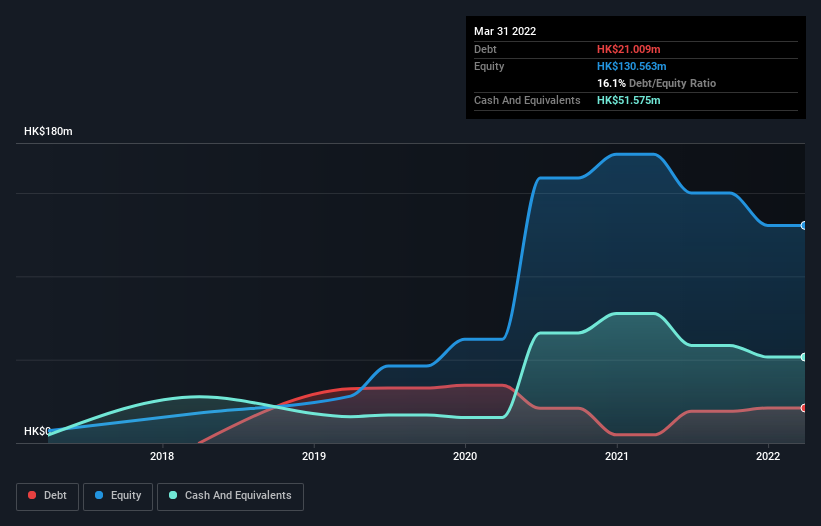- Hong Kong
- /
- Construction
- /
- SEHK:6063
Lotus Horizon Holdings (HKG:6063) Has Debt But No Earnings; Should You Worry?

David Iben put it well when he said, 'Volatility is not a risk we care about. What we care about is avoiding the permanent loss of capital.' So it seems the smart money knows that debt - which is usually involved in bankruptcies - is a very important factor, when you assess how risky a company is. As with many other companies Lotus Horizon Holdings Limited (HKG:6063) makes use of debt. But should shareholders be worried about its use of debt?
What Risk Does Debt Bring?
Debt is a tool to help businesses grow, but if a business is incapable of paying off its lenders, then it exists at their mercy. If things get really bad, the lenders can take control of the business. However, a more common (but still painful) scenario is that it has to raise new equity capital at a low price, thus permanently diluting shareholders. Of course, the upside of debt is that it often represents cheap capital, especially when it replaces dilution in a company with the ability to reinvest at high rates of return. The first step when considering a company's debt levels is to consider its cash and debt together.
See our latest analysis for Lotus Horizon Holdings
What Is Lotus Horizon Holdings's Debt?
You can click the graphic below for the historical numbers, but it shows that as of March 2022 Lotus Horizon Holdings had HK$21.0m of debt, an increase on HK$4.89m, over one year. However, its balance sheet shows it holds HK$51.6m in cash, so it actually has HK$30.6m net cash.

How Healthy Is Lotus Horizon Holdings' Balance Sheet?
The latest balance sheet data shows that Lotus Horizon Holdings had liabilities of HK$38.7m due within a year, and liabilities of HK$6.41m falling due after that. Offsetting these obligations, it had cash of HK$51.6m as well as receivables valued at HK$94.4m due within 12 months. So it actually has HK$100.8m more liquid assets than total liabilities.
This luscious liquidity implies that Lotus Horizon Holdings' balance sheet is sturdy like a giant sequoia tree. On this view, lenders should feel as safe as the beloved of a black-belt karate master. Simply put, the fact that Lotus Horizon Holdings has more cash than debt is arguably a good indication that it can manage its debt safely. There's no doubt that we learn most about debt from the balance sheet. But you can't view debt in total isolation; since Lotus Horizon Holdings will need earnings to service that debt. So if you're keen to discover more about its earnings, it might be worth checking out this graph of its long term earnings trend.
In the last year Lotus Horizon Holdings's revenue was pretty flat, and it made a negative EBIT. While that hardly impresses, its not too bad either.
So How Risky Is Lotus Horizon Holdings?
Statistically speaking companies that lose money are riskier than those that make money. And in the last year Lotus Horizon Holdings had an earnings before interest and tax (EBIT) loss, truth be told. And over the same period it saw negative free cash outflow of HK$27m and booked a HK$23m accounting loss. Given it only has net cash of HK$30.6m, the company may need to raise more capital if it doesn't reach break-even soon. Even though its balance sheet seems sufficiently liquid, debt always makes us a little nervous if a company doesn't produce free cash flow regularly. The balance sheet is clearly the area to focus on when you are analysing debt. But ultimately, every company can contain risks that exist outside of the balance sheet. We've identified 2 warning signs with Lotus Horizon Holdings (at least 1 which is significant) , and understanding them should be part of your investment process.
If you're interested in investing in businesses that can grow profits without the burden of debt, then check out this free list of growing businesses that have net cash on the balance sheet.
If you're looking to trade Lotus Horizon Holdings, open an account with the lowest-cost platform trusted by professionals, Interactive Brokers.
With clients in over 200 countries and territories, and access to 160 markets, IBKR lets you trade stocks, options, futures, forex, bonds and funds from a single integrated account.
Enjoy no hidden fees, no account minimums, and FX conversion rates as low as 0.03%, far better than what most brokers offer.
Sponsored ContentNew: AI Stock Screener & Alerts
Our new AI Stock Screener scans the market every day to uncover opportunities.
• Dividend Powerhouses (3%+ Yield)
• Undervalued Small Caps with Insider Buying
• High growth Tech and AI Companies
Or build your own from over 50 metrics.
Have feedback on this article? Concerned about the content? Get in touch with us directly. Alternatively, email editorial-team (at) simplywallst.com.
This article by Simply Wall St is general in nature. We provide commentary based on historical data and analyst forecasts only using an unbiased methodology and our articles are not intended to be financial advice. It does not constitute a recommendation to buy or sell any stock, and does not take account of your objectives, or your financial situation. We aim to bring you long-term focused analysis driven by fundamental data. Note that our analysis may not factor in the latest price-sensitive company announcements or qualitative material. Simply Wall St has no position in any stocks mentioned.
About SEHK:6063
Lotus Horizon Holdings
An investment holding company, provides design, supply, and installation services for facade works and building metal finishing works in Hong Kong.
Flawless balance sheet low.
Market Insights
Community Narratives




